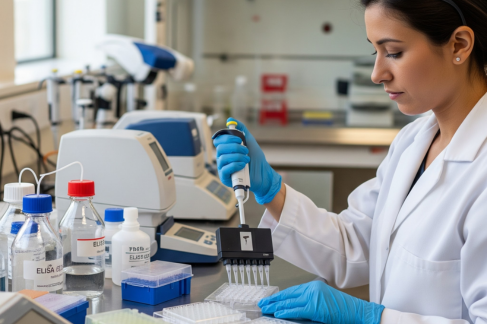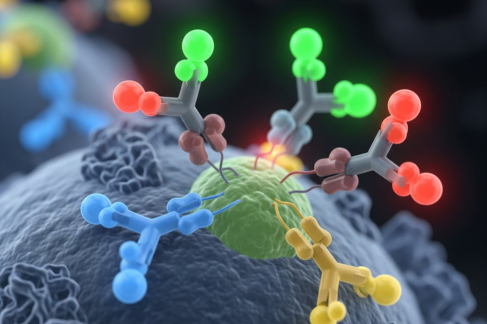
Inflammatory disorders, ranging from rheumatoid arthritis to inflammatory bowel disease, are complex conditions that involve the immune system’s abnormal or excessive response. Understanding these disorders at a molecular level is crucial for developing effective treatments and monitoring disease progression.
Among the essential tools used in this research, Enzyme-Linked Immunosorbent Assay (ELISA) kits have emerged as a reliable and sensitive method to detect and quantify specific proteins, cytokines, and biomarkers involved in inflammation.
Understanding ELISA and Its Significance
ELISA, or Enzyme-Linked Immunosorbent Assay, is a laboratory technique used to detect and quantify soluble substances such as proteins, antibodies, and hormones. The assay relies on antigen-antibody interactions, where a specific antibody binds to its target antigen, and an enzyme-linked secondary antibody produces a detectable signal, usually a color change. ELISA is highly sensitive, specific, and relatively easy to perform, making it a cornerstone in biomedical research.
For example, the WNT5B ELISA kit is designed to measure WNT5B protein levels, which play a role in inflammatory signaling pathways. By using such kits, researchers can study protein expression patterns in inflammatory disorders, providing insights into disease mechanisms and potential therapeutic targets.
How ELISA Kits Help in Inflammatory Disorders Research?
Cytokine Profiling
Cytokines are signaling molecules that regulate immune responses and inflammation. Inflammatory disorders are often characterized by abnormal cytokine levels, which can exacerbate tissue damage and disease symptoms. ELISA kits allow researchers to measure cytokine concentrations with high precision. For instance, IL-6, TNF-alpha, and IL-1β are key pro-inflammatory cytokines commonly assessed in rheumatoid arthritis and other autoimmune conditions. By quantifying these molecules, researchers can track disease progression, evaluate treatment responses, and identify potential biomarkers for early diagnosis.
Cytokine profiling using ELISA kits also helps in understanding the complex network of immune signaling. Since inflammation involves multiple pathways and interactions, monitoring specific cytokines can reveal patterns that indicate disease severity or response to therapy.
Evaluating Biomarkers for Diagnosis and Prognosis
Biomarkers are measurable indicators of biological processes or disease states. In inflammatory disorders, certain proteins, enzymes, or antibodies serve as biomarkers that can aid in diagnosis, prognosis, and treatment monitoring. ELISA kits are widely employed for biomarker research due to their accuracy and reproducibility.
For example, in patients with inflammatory bowel disease, ELISA kits can measure fecal calprotectin levels, a biomarker of intestinal inflammation. Elevated calprotectin levels correlate with disease activity, helping clinicians make informed decisions regarding treatment strategies. Similarly, ELISA kits can assess biomarkers like C-reactive protein (CRP) and serum amyloid A (SAA), which reflect systemic inflammation in conditions such as lupus or vasculitis.
Monitoring Drug Efficacy and Therapeutic Development
Drug development for inflammatory disorders requires rigorous evaluation of therapeutic efficacy. ELISA kits enable researchers to measure changes in target proteins or cytokines before and after treatment. This allows for quantitative assessment of how well a drug modulates inflammatory pathways.
For instance, biologic therapies targeting TNF-alpha or IL-6 can be monitored using specific ELISA kits to determine if cytokine levels decrease following treatment. Such measurements provide valuable feedback during clinical trials and help optimize dosing regimens for better patient outcomes.
Moreover, ELISA kits are instrumental in preclinical research, where animal models of inflammation are studied. Measuring cytokine or biomarker levels in these models provides insights into disease mechanisms and helps identify promising therapeutic candidates.
Advantages of ELISA Kits in Inflammatory Disorder Research
ELISA kits offer several advantages that make them indispensable in research:
High Sensitivity and Specificity – ELISA kits can detect minute amounts of proteins or cytokines, allowing researchers to study subtle changes in inflammatory pathways.
Quantitative Results – The assays provide numerical data, facilitating comparisons between different samples or time points.
Reproducibility – Standardized kits ensure consistent results across experiments, essential for validating research findings.
Versatility – ELISA kits are available for a wide range of targets, including cytokines, chemokines, growth factors, and signaling proteins.
These advantages make ELISA kits a reliable tool for advancing our understanding of inflammation and related disorders.
Challenges and Considerations
While ELISA kits are highly useful, researchers must consider certain limitations. Sample quality, handling, and storage can affect assay outcomes. Cross-reactivity with similar proteins may lead to false positives or negatives, emphasizing the need for careful experimental design. Additionally, interpreting results requires understanding the biological context, as cytokine levels may vary due to factors unrelated to disease progression.
Conclusion
ELISA kits have revolutionized inflammatory disorder research by providing a sensitive, specific, and quantitative method to study proteins and biomarkers. From cytokine profiling to biomarker evaluation and therapeutic monitoring, these kits play a vital role in understanding the mechanisms of inflammation and advancing treatment strategies.
For researchers looking to enhance their studies, it is advisable to buy ELISA kits from reliable suppliers to ensure accuracy and reproducibility. Kits like the WNT5B ELISA kit exemplify how targeted assays can provide critical insights into inflammatory signaling pathways. As inflammatory disorders continue to pose significant health challenges, ELISA technology remains a cornerstone in the quest for better diagnosis, treatment, and patient care.




Write a comment ...